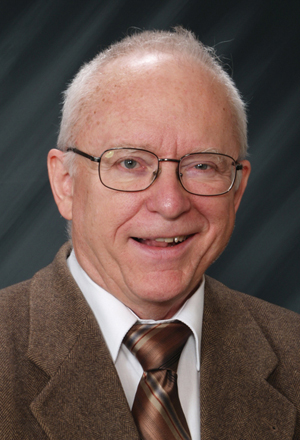FAYETTEVILLE, Ark. – Nobel laureate physicist John L. Hall will speak on the “Proposed Space Experiment to Test Einstein’s Assumptions about Space, Time and the Speed of Light” as the 2011 Robert D. Maurer Distinguished Lecturer. The lecture series, sponsored by the department of physics in the J. William Fulbright College of Arts and Sciences, is named after alumnus Robert D. Maurer, co-inventor of the first telecommunications-grade optical fiber.
This 15th annual Maurer Distinguished Lecture, which is free and open to the public, will be held at 7:30 p.m. Thursday, March 17, in Giffels Auditorium in Old Main on the university campus. A reception will follow.
Hall, a Fellow of the Joint Institute of Laboratory Astrophysics at the University of Colorado-Boulder, is a National Institute of Standards and Technology Senior Fellow emeritus. He shared the Nobel Prize in 2005 for his work on laser-based precision spectroscopy and the optical frequency comb technique with Theodore Hänsch of the Max Planck Institute and Roy J. Glauber of Harvard. Hall pioneered the use of stabilized lasers to accomplish measurements of unprecedented accuracy and intrinsic physical interest. He introduced the methane/HeNe stabilized laser and, with his National Bureau of Standards team, used it to measure the speed of light accurately. His group has stabilized various tunable lasers, even diode lasers, to sub-hertz line widths. He also demonstrated how fiber noise could be actively suppressed to deliver phase-stable light at a distant site. Hall has received numerous other awards, has more than 235 refereed publications, and holds 11 U.S. patents.
In his lecture, Hall will discuss how the accelerated pace of progress in controls and applications of lasers in precision measurements has continued unabated 50 years after the invention of the laser. He will reveal how optical frequency comb technology exploded from 1999 to 2000 because of the synthesis of independent advances in the fields of laser stabilization, ultrafast lasers, and nonlinear optical fibers, enabling a thousand-fold advance in optical frequency measurement and searches (in the 16th digit) for time-variations of physical “constants.”
He will discuss how newer inventions in ultra-precise locking are making possible stable optical frequencies defined by length and the speed of light, as compared with those based on the resonant frequency of atoms. These two represent the prototypes of “clocks,” whose properties were postulated by Einstein in 1905 in formulating the theory of special relativity. Hall will detail how Einstein’s assumption can now be tested to an accuracy of 18 decimal places in a proposed space-based experiment now being planned by the Space-Time Asymmetry Research collaboration.
Topics
Contacts
Donna Johnson, office manager, department of physics
J. William Fulbright College of Arts and Sciences
479-575-5915,
Surendra Singh, chair, department of physics
J. William Fulbright College of Arts and Sciences
479-575-2506,
